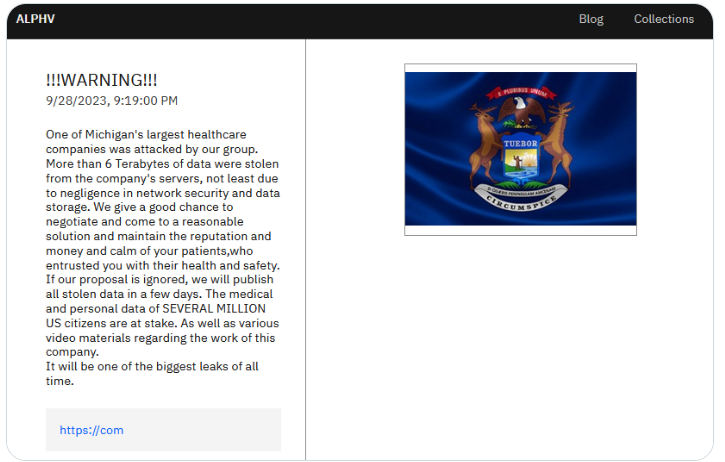In a recent cybersecurity incident, MNGI Digestive Health, a prominent healthcare provider, finds itself at the center of a data breach crisis. The notorious ransomware group BalckCat/ALPHV, has targeted healthcare organizations. Here’s a timeline of events:
- September 24, 2023: The ransomware group ALPHV claims to have successfully stolen over 2 terabytes of sensitive data from MNGI Digestive Health. In a ransom note, they demand payment within 48 hours to prevent the data’s release.
- September 29, 2023: MNGI Digestive Health decides not to comply with the ransom demands, taking a stand against cybercriminals. ALPHV responded by announcing their intention to publish the stolen data.
- September 30, 2023: ALPHV makes good on their threat and begins releasing the first 800 gigabytes of the stolen data to the public. This includes patient records, employee information, and internal company data. The breach is a significant blow to MNGI Digestive Health’s reputation.
- October 7, 2023: AlphV escalates their attack by threatening to release the remaining sensitive data and send notify patients of the attack with details on how to file lawsuits.

The healthcare organization has not released any official statement confirming or denying the attack. When vpninsights tried to reach out to the organisation, they were lost in the hurdles of technical communication and could not get a statement.
In light of recent events, the BlackCat ransomware group is now targeting other healthcare organizations. It has now stolen 6TB of patient information from Michegan’s largest healthcare organization, McLaren. The healthcare organstion had faced issues on their network a few days back and had to close down their network. The ransomware group later took responsibility for the attack on its dark website. The healthcare organization is trying to regain control of the situation and involve law enforcement authorities.

Impact of the Data Breach:
The breach at MNGI Digestive Health has severe consequences for both the organization and its patients:
- Privacy Violation: Patients’ personal and medical information is exposed, putting them at risk of identity theft and fraudulent activities.
- Reputation Damage: The breach tarnishes the reputation of MNGI Digestive Health, eroding trust among patients, partners, and employees.
- Legal Consequences: The threat of lawsuits looms large, potentially resulting in costly legal battles and financial penalties.
MNGI is a notable healthcare provider and they are trying to safeguard the safety of their patients
What Patients Can Do to Protect Themselves:
Patients who have received care from MNGI Digestive Health can take several steps to safeguard their information:
- Monitor Accounts: Regularly review bank and credit card statements for suspicious transactions.
- Change Passwords: Update passwords for online accounts, especially those linked to sensitive data.
- Beware of Phishing: Be cautious about opening emails or clicking on links from unknown sources.
- Credit Monitoring: Consider enrolling in credit monitoring services to detect unauthorized activity.
These safety measures can help ensure that patients’ personal information remains safe even after this attack.
What Healthcare Organizations Can Do to Protect Themselves:
Healthcare organizations must prioritize cybersecurity to prevent ransomware attacks:
- Enhanced Security: Implement robust security measures such as firewalls, intrusion detection systems, and encryption.
- Employee Training: Conduct cybersecurity training for staff to recognize and report phishing attempts.
- Data Backups: Regularly back up data to enable quick recovery in case of an attack.
- Incident Response Plan: Develop and practice a clear plan to address ransomware attacks effectively.
The MNGI Digestive Health data breach underscores the persistent threat of ransomware in the healthcare sector. By taking proactive cybersecurity measures and responding swiftly to breaches, healthcare organizations can reduce the risk of falling victim to cyberattacks and protect the sensitive data entrusted to them.